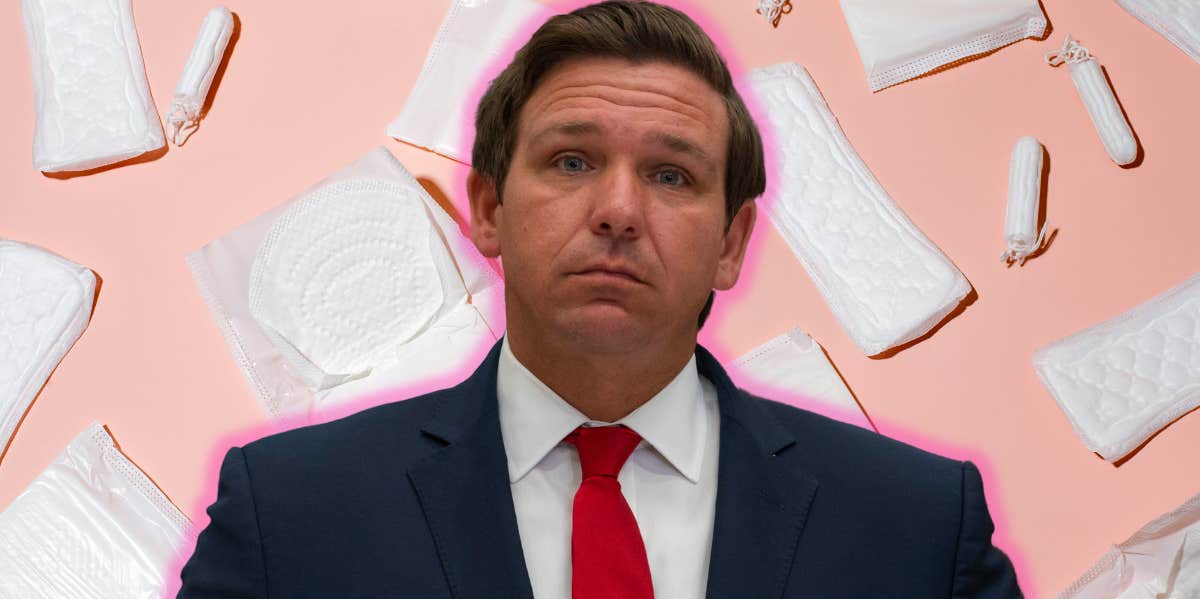Ron DeSantis, Stop Telling Us How To Talk About Our Bodies—Florida's 'Don't Say Periods' Bill Is A Detriment To Kids Everywhere
Not talking about periods doesn't stop them from happening— it just creates a culture of shame.
 Katerina Morozova, Hunter Crenian / Shutterstock
Katerina Morozova, Hunter Crenian / Shutterstock In a moment of increasingly draconian, state-ordinated legislation aimed at controlling free speech and limiting bodily autonomy, Florida’s House Bill 1069 is especially chilling.
House Bill 1069, also referred to as the “Don’t Say Period” Bill, passed in the Republican-controlled Florida House of Representatives in March 2023. The bill was sponsored by Representative Stan McClain. If it passes Florida’s Senate and is signed into law by Governor Ron DeSantis, the bill would go into effect on July 1, 2023.
The bill would restrict instruction on human sexuality offered by public schools to grades 6 through 12 only. Students in grades below 6th grade would not be able to access that education.
McClain makes the claim that the bill's intent is to bring uniformity to sex education across Florida’s 67 school districts and provide more paths for parents to voice objections to educational materials they deem inappropriate for young children.
RELATED: Why Florida’s ‘Don’t Say Gay’ Bill Is A Direct Attack On Children’s Mental Health
But Florida's 'Don't Say Periods' bill is just another attempt for the state to police bodies.
McClain stated that menstrual cycles are one of the topics restricted to grades 6 through 12. The 61-year-old man, who has—we assume—never personally experienced a menstrual cycle, said that the goal of the bill is not to punish girls, that’s exactly what the bill would, in effect, do.
Not allowing conversation about a mostly universal and incredibly normal bodily experience creates an atmosphere where girls are shamed for being themselves. They’re made to feel embarrassed for something they can’t control.
The silence around periods is a repressive tactic, designed to isolate. This bill denies all students basic education about being a human with a body.
As noted by Nadya Okamoto, an advocate for sustainable period care, “Culturally, we should be pushing for all of our communities to feel educated and aware of bodies and that change needs to happen across generations.”
RELATED: Woman Tells Boss It's Her Time Of The Month & Gets Sent Home — Others Can't Believe She Got PTO
In committee, representative Ashley Gantt, a Democrat, asked McClain the question, “So if little girls experience their menstrual cycle in 5th grade or 4th grade, will that prohibit conversations from them since they are in the grade lower than sixth grade?”
“It would,” McClain answered.
Healthline reports that the average age of the onset of menstruation is 12 years old. Yet they state that starting one’s period between the ages of 10 and 15 is also within the range of average, and they note that it’s not uncommon for periods to begin as young as 8 years old. With those numbers in mind, the bill does a direct disservice to young students navigating the ways that their bodies will inevitably change.
Gantt voiced her concern that teachers of girls younger than 6th grade wouldn’t feel safe having open conversations with those girls about their periods. McClain replied “that would not be the intent” of the bill, and expressed that he was open to certain changes in the bill’s language.
However, it’s the bill’s very existence that causes concern.
According to the bill’s own language, in the “instruction in human sexuality, a school shall: teach that biological males impregnate biological females… And teach that these reproductive roles are binary, stable, and unchangeable.”
The bill also states that “classroom instruction by school personnel or third parties on sexual orientation or gender identity may not occur in prekindergarten through grade 8. If such instruction is provided in grades 9 through 12, the instruction must be age appropriate or developmentally appropriate for students in accordance with state standards.”
HB1069 would also mandate abstinence-only education, requiring “teaching the benefits of monogamous heterosexual marriage.”
The bill would also mandate “sex ed programs to teach that sex is determined by reproductive function at birth and is binary and unchangeable and to use only materials approved by the state Department of Education.”
HB1069 can be viewed as an extension of HB1223, also known as the “Don’t Say Gay” Bill, as it aims to prohibit both school employees and students from using certain pronouns and titles of their choosing.
Additionally, the bill would put into place stricter reviews of certain educational materials by the Florida Department of Education, and it would allow parents to object to books and other academic materials that their children utilize in school.
McClain and his Republican colleagues are legislating bodies that don’t belong to them. They’re making determinations on what’s acceptable, and they’re not listening to or even asking the opinion of those who spend their lived, daily experience in those particular bodies.
Alexandra Blogier is a writer on YourTango's news and entertainment team. She covers celebrity gossip, pop culture analysis and all things to do with the entertainment industry.
